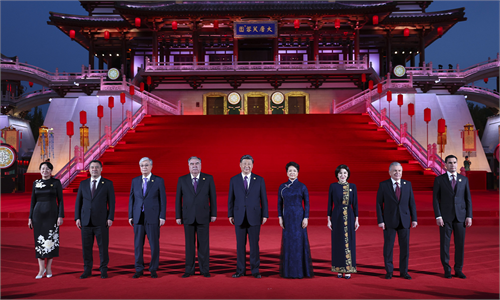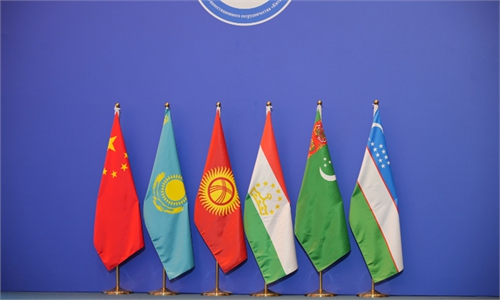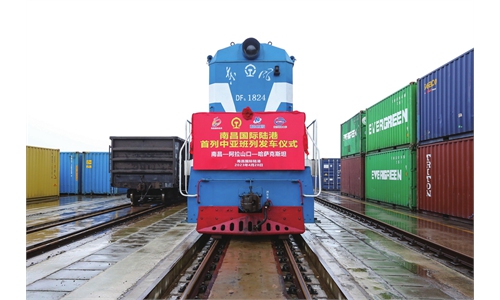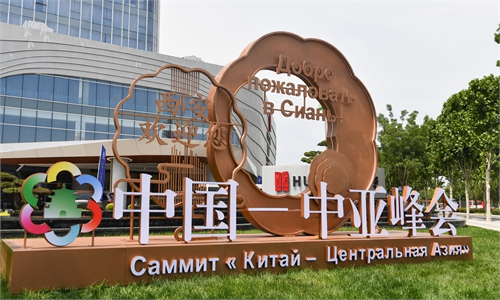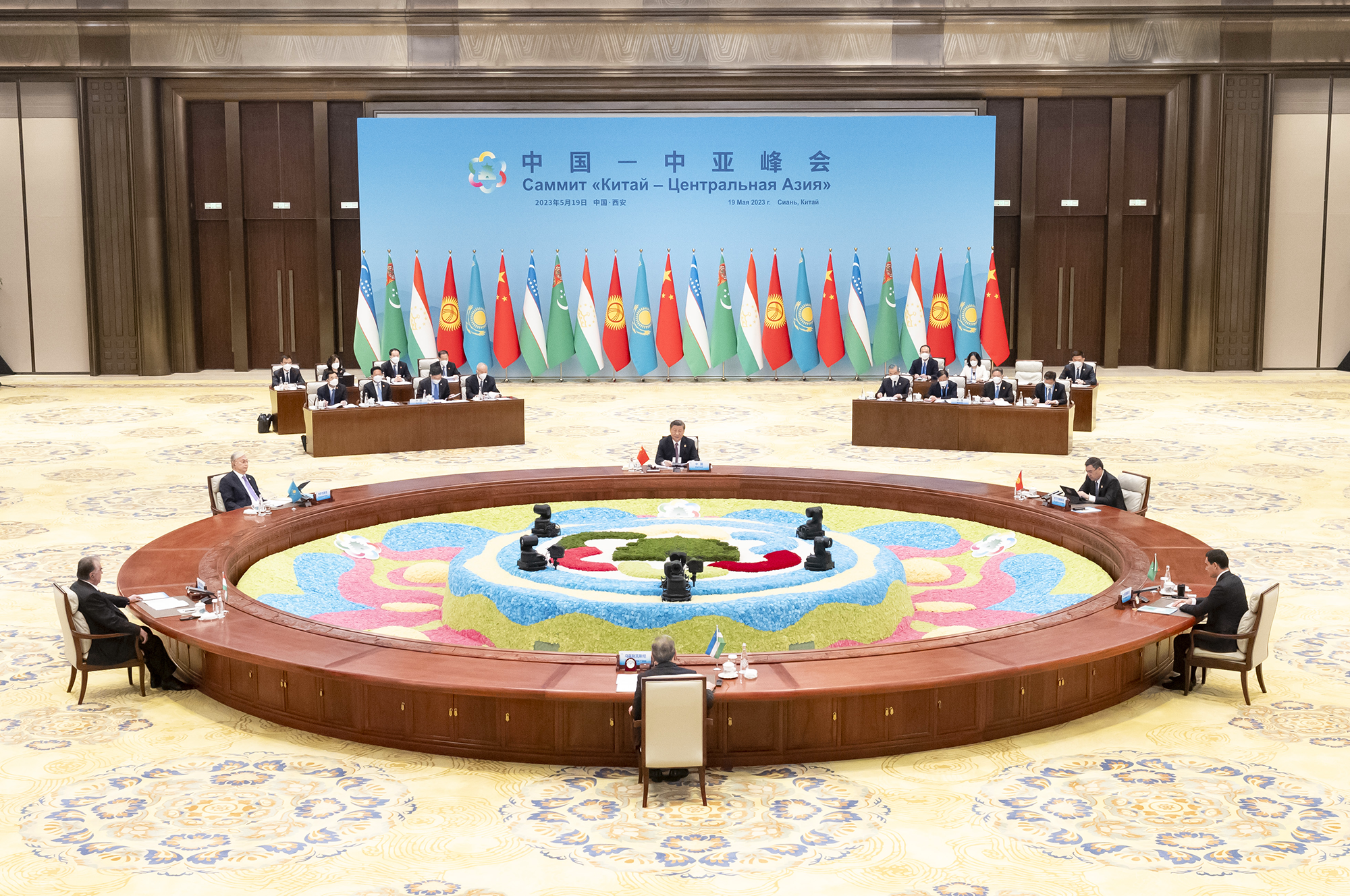
Chinese President Xi Jinping (center) chairs the first China-Central Asia Summit and delivers a keynote speech themed "Working Together for a China-Central Asia Community with a Shared Future Featuring Mutual Assistance, Common Development, Universal Security, and Everlasting Friendship" in Xi'an, Northwest China's Shaanxi Province, on May 19, 2023. Photo: Xinhua
Chinese President Xi Jinping on Friday charted the course for China-Central Asia cooperation, calling for strengthening cooperation in various areas including industry and investment, enhancing connectivity and building energy development partnership with Central Asian countries. Meanwhile, the Chinese President also called for joint efforts to oppose external attempts to interfere in domestic affairs of regional countries and instigate "color revolutions" in the region.
Experts hailed the summit as achieving a great success, as it has institutionalized top-level exchanges between leaders from China and the five Central Asian countries, created plentiful cooperation mechanisms that are set to release great cooperation potential between China and Central Asian countries, and reinforced security cooperation, which also demonstrated elevated political mutual trust between both sides. China and Central Asian countries have set a paragon for regional cooperation and would inject much-needed positive energy into the world's peace, stability and development, they said.
Rejecting foreign media's hyping of Russia-China competition in this region, experts said as external forces shored up their interference in Central Asia, China's enhanced cooperation with Central Asia benefits Russia and the region, and some foreign media's attempts to sow discord are futile as cooperations between the three sides are complementary, and there is no contradiction in China and Russia's cooperation with Central Asia.
The China-Central Asia Summit, which ran from Thursday to Friday in Xi'an, was attended by President Kassym-Jomart Tokayev of Kazakhstan, President Sadyr Japarov of Kyrgyzstan, President Emomali Rahmon of Tajikistan, President Serdar Berdimuhamedov of Turkmenistan and President Shavkat Mirziyoyev of Uzbekistan.
During the event, China and the five Central Asian countries signed seven bilateral and multilateral documents, including the Xi'an Declaration of the China-Central Asia Summit and the List of Outcomes of the China- Central Asia Summit.
In his keynote address, Xi made an eight-point proposal ranging from expanding economic ties to strengthening cultural exchanges and safeguarding regional peace. Moreover, Xi and the leaders of the five Central Asian countries announced on Friday the official establishment of the China-Central Asia Summit Mechanism. China and Central Asian countries will take turns to host the biennial summit and the next summit will be held in Kazakhstan in 2025. The leaders also agreed to establish a permanent secretariat of the mechanism in China.
The proposals also included establishing meeting and dialogue mechanisms in industry and investment, agriculture, transportation, emergency management, education, and political party affairs; building a China-Central Asia energy development partnership, and accelerating the construction of Line D of the China-Central Asia natural gas pipeline.
Moreover, to enhance connectivity, Xi said China will boost cross-border freight volumes, support the construction of a cross-Caspian Sea international transport corridor, accelerate the upgrading of ports, develop China-Europe freight train hubs, and encourage businesses to build overseas warehouses in Central Asian countries.
Deepening connectivity is an important impetus for China and the Central Asian region to enhance their economic development and capabilities. At the same time, it will have a series of economic amplification effects, which will strengthen the connection between Central Asian countries and South Asia, West Asia, the Caucasus countries as well as Europe, thus expanding cooperation and investment with other regions, Zhu Yongbiao, executive director of the Research Center for the Belt and Road at Lanzhou University, told the Global Times on Friday.
Before the summit was convened, officials from the Civil Aviation Administration of China said it was holding discussions with the five Central Asian countries and preparing to sign a Memorandum of Understanding to jointly develop an "Air Silk Road." China and Kazakhstan are building a third railway on the border between the two countries due to increased rail transport demand, Kazakhstan's ambassador to China Shakhrat Nuryshev said in 2022.
The Central Asia-to-China gas pipeline, constructed and operated by the Sino-Pipeline International arm of the CNPC, began operations with Line A in 2009, Line B in 2010, and Line C in 2014, and has a combined transport capacity of 55 billion cubic meters per year. The three lines run in parallel, and zigzag across 1,833 kilometers from Uzbekistan and Kazakhstan to northwest China.
Amid an unstable international energy market and volatile energy prices, a stable and integrated energy partnership is of positive significance for both sides, and is important to safeguarding bilateral industrial security and energy security, and also makes a vital contribution to stabilizing the international energy market, Zhu noted.
Reinforcing security ties
Xi said it is important to act on the Global Security Initiative, and stand firm against external attempts to interfere in the domestic affairs of regional countries or instigate color revolutions. The countries should maintain a zero-tolerance approach to the three forces of terrorism, separatism and extremism, and strive to resolve security conundrums in the region.
He said that China is ready to help Central Asian countries improve their law enforcement, security, and defense capacity building in an effort to safeguard regional peace. Efforts should also be made to make good use of the mechanism of coordination among Afghanistan's neighbors and jointly promote peace and reconstruction in the country.
China has a long tradition of cooperating with Central Asian countries on security, and stressing these issues at the milestone summit highlighted that China and those countries share a high level of consensus on those topics, Yang Jin, an associate research fellow at the Institute of Russian, Eastern European and Central Asian Studies at the Chinese Academy of Social Sciences, told the Global Times.
Due to interference from external forces, Central Asian countries witnessed a slew of turbulent incidents in recent years, said Yang, citing the social unrest in Kazakhstan in January 2022.
Vowing to enhance cooperation in security and defense also shows that political mutual trust is enhanced between China and Central Asian countries, said experts.
Bloomberg published an article on Friday highlighting China's pledge to strengthen security cooperation with Central Asian countries, saying it demonstrated Beijing's increasingly senior position in its ties with Russia. Russia is also a traditional collaborator with Central Asia in the security field.
Yang said that China enhancing security ties with Central Asia benefits Russia, as the latter is preoccupied with the conflict in Ukraine. As external forces upped the ante in interfering with Central Asia, enhanced cooperation between China and those countries helped to foster stability in the region and prevent color revolutions, which is in line with Russia's interests.
No contradiction
Reuters reported on Friday that the summit taking place on Chinese soil without Russian President Vladimir Putin attending also ostensibly pulls Central Asia closer to the Chinese sphere of influence, as Moscow's focus remains locked on the conflict with Ukraine.
Chinese observers called such hype as "typical tricks" used by Western media to sow discord between China, Russia and Central Asia.
Whether it is at a bilateral or multilateral level, China's ties with Russia and Central Asian countries are steadily developing, and Russia holds a positive attitude to China's cooperation with Central Asian countries and is attaching growing importance to China's positive role in pushing prosperity and stability in Central Asia, Zhao Huirong, an Eastern European studies expert from the Chinese Academy of Social Sciences, told the Global Times.
Cooperation between China, Russia and Central Asia is a process of mutual engagement, and not spearheaded by any one country, said Zhao. She noted that such cooperation is based on each others' interests, with an eye on long-term development. "For Central Asian countries, they stick to diverse diplomacy; they wish to cooperate closely with China and maintain friendly relations with Russia, there's no contradiction in such motivations," said Zhao.
Experts said that both China and Russia have already established mature cooperation mechanisms in Central Asia, thus against the backdrop of the US trying to gain influence in the region, China's reinforcing cooperation with those countries is in line with Russia's interests.
In Japan, in another summit being held between May 19 and 21, G7 leaders seek to hammer out a unified response to so-called Chinese "economic coercion." New York Times described the China-Central Asia Summit as China's effort to counter "a US-dominated world order that is trying to contain and suppress China."
Wang Xiaoquan, an expert from the Institute of Russian, East European and Central Asian Studies at the Chinese Academy of Social Sciences, opined that the convening of the China-Central Asia Summit was not deliberately scheduled to overlap with G7, as a high-level leaders' summit requires a long time to prepare in advance, but the two summits, held at approximately the same time and fairly close to each other, send "meaningful signals" to the world.
In an interview with media on Friday, Chinese State Councilor and Foreign Minister Qin Gang said that China's cooperation with Central Asian countries does not target any third party, is not constrained by a third party, does not seek to form small cliques that exclude others, and opposes bloc politics and Cold War confrontation. Qin said that such cooperation stands on the right side of history and on the side of civilization, and will stand with the international community against global challenges, and promote peace as well as development.
G7 focuses on discussing domination of the world order and monopoly of the global economy, while China and Central Asian countries, all developing countries, seek to build a fairer and more rational world order, said Wang.
